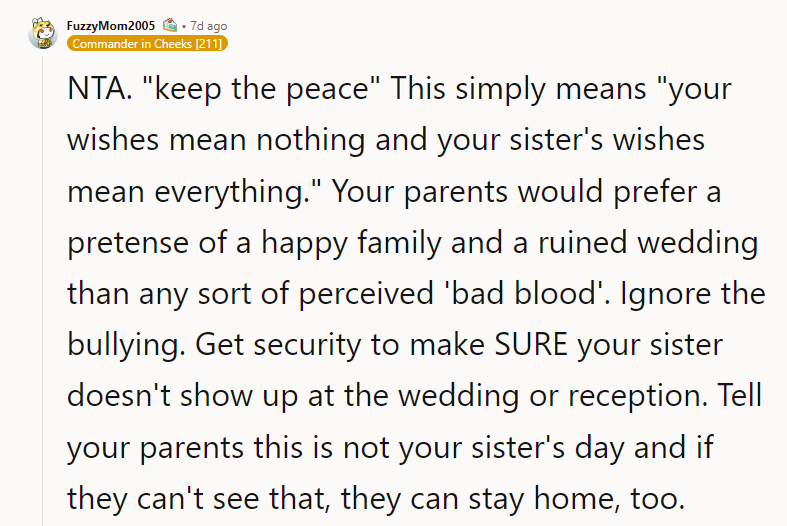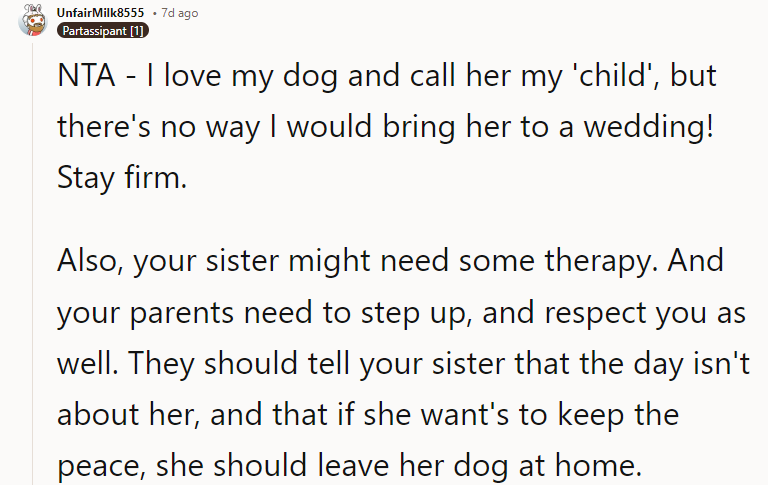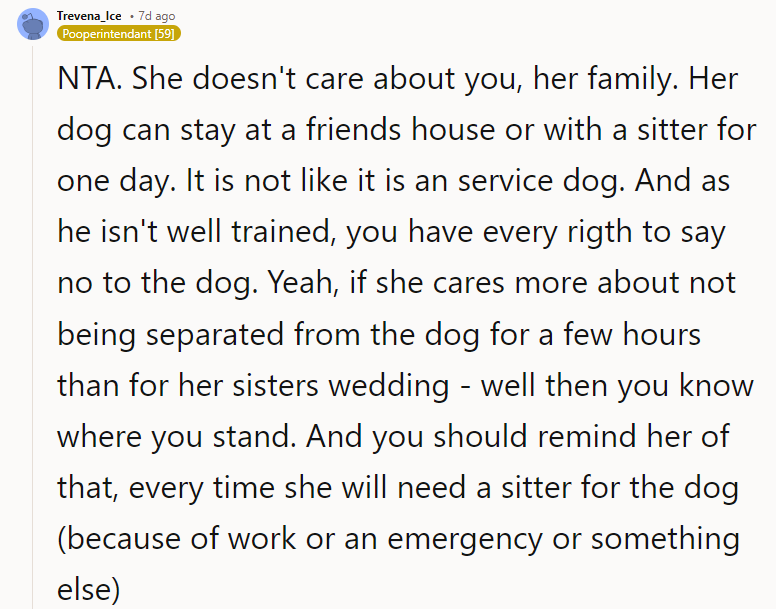AITA For Banning My Sister's Dog From My Wedding
Weddings, while often seen as a culmination of love and happiness, can sometimes be the stage for unexpected family conflicts. This story, shared by a 26-year-old groom on Reddit, highlights the complexities that arise when personal boundaries clash with family dynamics.
The groom is in the midst of planning his wedding, a day he envisions as serene and memorable. However, his sister's attachment to her large and unruly Bernese Mountain dog poses a significant problem.
Known for its disruptive behavior, the dog has previously caused chaos at family events, including knocking over an elderly guest at a cousin’s wedding and eating part of the Thanksgiving turkey. Determined to avoid similar disruptions, the groom decides not to invite the dog to his wedding.
Anticipating that his sister would bring the dog regardless of a simple request, he firmly states that she and her pet are not welcome if the dog is brought along. His sister’s reaction is one of fury and hurt, accusing him of disregarding her happiness and forcing her to choose between her family and her beloved pet.
As the wedding day approaches, the groom stands firm in his decision despite pressure from his parents to relent for the sake of family harmony.
The Story,

She takes it everywhere with her,

The Complexity of Family Dynamics
Family dynamics often involve intricate emotional ties and expectations, which can lead to conflicts during significant life events.
Dr. Sarah Mitchell, a family therapist at UCLA, notes that when a family member feels their needs are being overlooked, it can create significant tension.
Her research indicates that establishing boundaries is essential for maintaining healthy relationships, particularly during emotionally charged events like weddings.
It ate part of the turkey off the table when no one was looking.

When I sent out my wedding invitations, I decided not to invite her dog.

Conflict over pets in family settings can often serve as a microcosm of larger relational issues.
Studies have shown that disagreements regarding pets can reflect deeper issues of control, responsibility, and emotional attachment.
Understanding these dynamics can help individuals navigate conflicts more effectively, fostering better communication and resolution.
My sister was furious and said that if her dog isn’t welcome

My parents think I should just let her bring the dog to keep the peace,

The groom, a 26-year-old man, is busy planning his upcoming wedding. One significant issue he faces is his sister's insistence on bringing her large and somewhat unruly Bernese Mountain dog to every family event.
This dog has caused numerous problems in the past, including knocking over guests, damaging decorations at a cousin's wedding, and even eating part of the turkey at a family holiday dinner. In an effort to ensure a smooth and beautiful wedding, he decided not to invite the dog, knowing that merely asking his sister not to bring it would not be enough.
His sister's reaction was one of anger and defiance, claiming that if her dog wasn't welcome, she wouldn't attend either. The groom's parents suggested allowing the dog to keep the peace, but he and his fiancée are firm in their decision.
AITA for not inviting my sister to my wedding because she always brings her dog?

Get security to make SURE your sister doesn't show up at the wedding or reception.

The Role of Communication in Conflict Resolution
Effective communication is key when addressing conflicts within families.
According to Dr. Ian Kerner, a licensed sex therapist, "Open and honest dialogue is essential to prevent misunderstandings and resentment from building up." He emphasizes that utilizing 'I' statements and focusing on feelings rather than accusations can lead to more constructive conversations. This approach can help family members express their needs while fostering a supportive environment.
Your parents are ridiculous for trying to let her get her way again,

They could kick out anyone who shows up with a dog.

In cases where family members disagree, it may be helpful to involve a neutral third party to mediate discussions.
Family therapy sessions can provide a safe space for individuals to express their feelings and work through conflicts constructively.
Engaging a professional can help families develop healthier communication patterns and establish clearer boundaries.
NTA x10000

They should tell your sister that the day isn't about her, and that if she wants to keep the peace, she should leave her dog at home.

As the story comes to a close, the groom remains steadfast in his decision to keep his wedding a dog-free event despite the backlash from his sister and the pressure from his parents.
This situation raises several questions for readers: What would you do in this scenario? Is it reasonable to ask a family member to leave their pet behind for a special occasion, or should the bonds of family accommodate such requests?
Share your thoughts and experiences in the comments below. How would you handle a similar dilemma in your own family?
And you should remind her of that, every time she will need a sitter for the dog,

Psychological Analysis
This situation illustrates the common tension between personal boundaries and family expectations, particularly regarding significant life events.
From a psychological perspective, understanding one’s values and the importance of communication can help navigate these complex dynamics effectively.
Analysis generated by AI
Analysis & Alternative Approaches
Family dynamics can be intricate and challenging, especially when it comes to high-stakes events like weddings.
As noted by Dr. Terri Orbuch, a relationship researcher and author, "Open communication is essential in resolving conflicts and maintaining healthy family relationships." By focusing on personal values and expressing needs, individuals can navigate these complex situations more effectively.
Ultimately, establishing boundaries while honoring one's needs is crucial for maintaining emotional well-being.
Understanding Personal Values in Family Decisions
When making decisions that impact family gatherings, it’s essential to consider personal values alongside familial expectations.
Dr. John Miller, a psychologist at the University of Michigan, emphasizes that aligning decisions with personal values can lead to greater satisfaction and reduced stress.
His research suggests that individuals who prioritize their values tend to experience less guilt and more empowerment in their choices.




